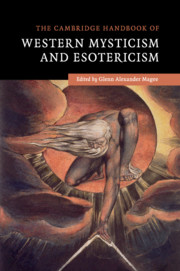Book contents
- Frontmatter
- Dedication
- Contents
- Acknowledgments
- Editor's Introduction
- List of contributors
- I ANTIQUITY
- II THE MIDDLE AGES
- III THE RENAISSANCE AND EARLY MODERNITY
- IV THE NINETEENTH CENTURY AND BEYOND
- 20 Spiritualism
- 21 H. P. Blavatsky and Theosophy
- 22 Rudolf Steiner and Anthroposophy
- 23 The Golden Dawn and the O.T.O.
- 24 G. I. Gurdjieff and the Fourth Way
- 25 C. G. Jung and Jungianism
- 26 René Guénon and Traditionalism
- 27 Via Negativa in the Twentieth Century
- 28 Contemporary Paganism
- 29 The New Age
- V COMMON THREADS
- Suggestions for Further Reading
- Index
- References
22 - Rudolf Steiner and Anthroposophy
from IV - THE NINETEENTH CENTURY AND BEYOND
Published online by Cambridge University Press: 05 May 2016
- Frontmatter
- Dedication
- Contents
- Acknowledgments
- Editor's Introduction
- List of contributors
- I ANTIQUITY
- II THE MIDDLE AGES
- III THE RENAISSANCE AND EARLY MODERNITY
- IV THE NINETEENTH CENTURY AND BEYOND
- 20 Spiritualism
- 21 H. P. Blavatsky and Theosophy
- 22 Rudolf Steiner and Anthroposophy
- 23 The Golden Dawn and the O.T.O.
- 24 G. I. Gurdjieff and the Fourth Way
- 25 C. G. Jung and Jungianism
- 26 René Guénon and Traditionalism
- 27 Via Negativa in the Twentieth Century
- 28 Contemporary Paganism
- 29 The New Age
- V COMMON THREADS
- Suggestions for Further Reading
- Index
- References
Summary
Introduction
Rudolf Steiner (1861–1925) is the founder and teacher of anthroposophy, which derives its name from the Greek anthropos (understood by Steiner to mean “ideal human”) and sophia, which refers to divine feminine wisdom. Anthroposophy overlaps with religion and mysticism in that it is focused on the human experience of the divine, but its emphasis is on a spiritual knowledge that is in principle difficult to attain. Steiner insisted that in theory others could attain the same kind of knowledge that he had. In fact, however, very few have been able to attain the profound secrets of evolution, higher beings, as well as afterlife and rebirth, all of which Steiner claimed to have researched successfully.
Steiner reported his esoteric research in three thousand lectures recorded by stenographers. As he continued to write, lecture, administer, and counsel, he did not have time to revise these lectures for publication. However, Steinerbooks has now undertaken the project of publishing his collected works in 354 volumes. Steiner's writings contain important contributions to philosophy, the natural and social sciences, the arts, education, and the study of Asian and Western spiritual traditions. Steiner is perhaps best known for the Waldorf School movement, consisting of more than one thousand schools in more than one hundred countries. These schools continue to draw guidance from his hundreds of lectures on child development, curriculum, and pedagogy.
Steiner wrote approximately thirty books, beginning in 1891 with Truth and Knowledge, his doctoral dissertation in philosophy, and ending in 1924, the year before he died, with his autobiography (which unfortunately covers only up to 1907, therefore before the beginning of the Anthroposophical Society, and before most of his important research). Steiner was convinced that his Philosophy of Freedom, which he wrote in 1894, at age 33, would be the book that would be his most lasting and influential. It seems more likely, however, that his Theosophy (1904) and How to Know Higher Worlds (1904) might prove more enduring, perhaps because for most readers both are more immediately accessible than Philosophy of Freedom.
Rudolf Steiner believed his esoteric mission and research to be a continuation of the tradition associated with the mysterious fifteenth-century esoteric teacher Christian Rosenkreutz. However, he also intended his teaching to be entirely relevant and contemporary, especially given that he set it in direct opposition to the reductionist science of his day.
- Type
- Chapter
- Information
- The Cambridge Handbook of Western Mysticism and Esotericism , pp. 260 - 271Publisher: Cambridge University PressPrint publication year: 2016
References
- 2
- Cited by



